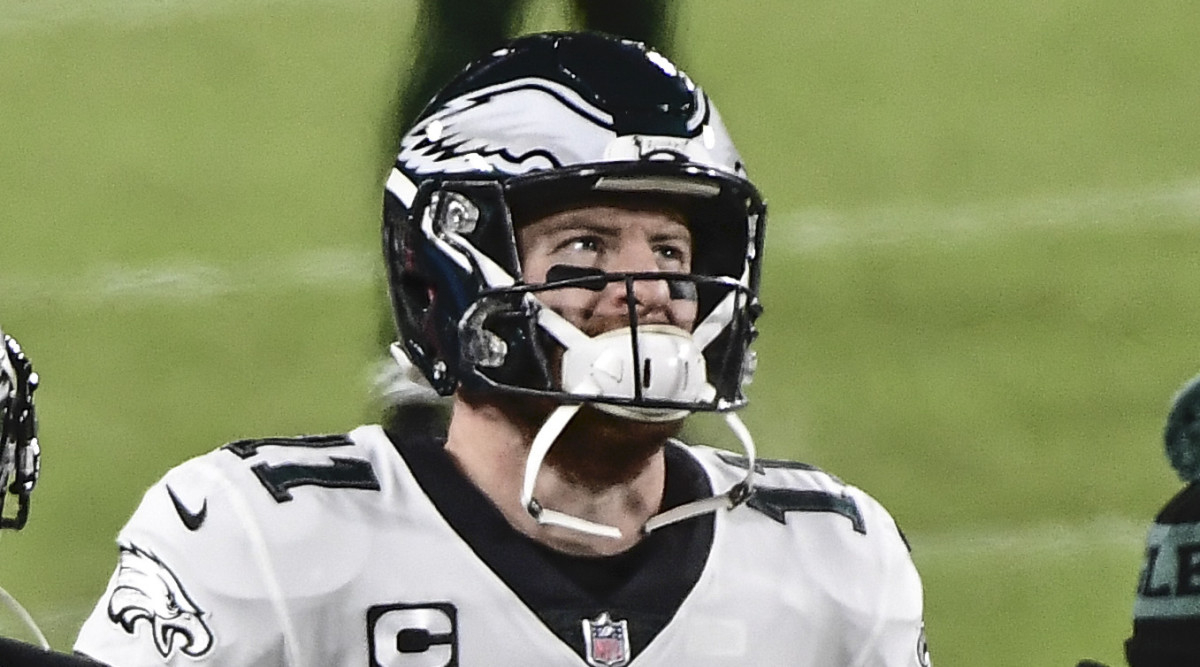There's No Going Back to Carson Wentz Now
In the coming days and weeks, we’re going to hear a lot about Carson Wentz and confidence.
It’s the ghost that has tailed Wentz throughout his career, after all. We wondered how he could stomach Nick Foles winning his Super Bowl. We wondered how he could watch Foles needing to supplant him again the year after, or Josh McCown the year after that in a playoff game. We wondered how Wentz would exist in this kind of existential limbo; a player who always held the title of franchise quarterback but never cemented the credentials, through no fault of his own. A guy who perpetually ceded the kind of mythos reserved for the team’s most important player to his backups.

Thinking back on it now, how could we not wonder about his emotional hardwiring after the Eagles selected Jalen Hurts in the second round of the 2020 draft? Hurts was a productive collegiate star, being drafted despite countless other needs. Wentz was a quarterback in desperate need of a moment to process both the fortunate and unfortunate absurdities of his career and what kind of player he could become under the best of circumstances. He never got it.
Then, his career took another turn on Sunday against the Packers, though this may have been the last in which we saw Wentz’s status as the team’s unquestioned starter remain an inevitability. Doug Pederson said he removed Wentz in search of a spark, which was only intended for one series. Then Hurts got another series, and another, and another after that. By doing so, this was the first time that Pederson said with his actions that Wentz was the one who was holding this entire operation back amid this ugly season where seven wins could seal an NFC East title and a home playoff game. The Eagles hinted at the idea of making a change several times throughout the year, especially when Hurts was incorporated into the game plan regularly. But Sunday was the moment where everything changed definitively.
Pederson looked like a coach who knew there was no turning back. Anyone, probably, who has followed Wentz to this point could understand the magnitude of what happened and how difficult it might be—especially now—to craft a scenario where Wentz gets fixed quickly; where Wentz becomes the franchise quarterback in Philadelphia we’d all imagined he would one day become. What does that process look like when compared to the easier path: exploring Hurts for the remainder of the season and getting a large enough sample size to make a proper evaluation?
The Weak-Side Podcast now has its own feed! Subscribe to listen to Conor Orr and Jenny every week.
It’s hard to call Wentz’s story a tragedy because, even if these were his last snaps in Philadelphia, he had so much more than some of his contemporaries. Wentz had weapons and a great offensive line. He had a coaching staff willing to understand what made him successful in college and reinvent their offense to accommodate him. This Eagles season was lost to injury and age and, in a period like this, the hope was that Wentz would shoulder the franchise like the front office and coaching staff always believed he could. Like Foles had done during similar times of chaos.
But Wentz’s inability to bridge the Eagles from the tail end of their Super Bowl window to the next phase of their roster construction was concerning enough to Pederson and the rest of the staff that it was time to start looking at other options. Rebuilding the Eagles from their current state is going to be a difficult, expensive and lengthy process. If the quarterback cannot generate a significant amount of the lift at a premium salary, it’s hard to linger on the sentimentality of what was and what is supposed to be.
This is not to say that Wentz will not at some point claw his way back, whether in Philadelphia or somewhere else. It’s merely the recognition of a lack of confidence—from all sides.
